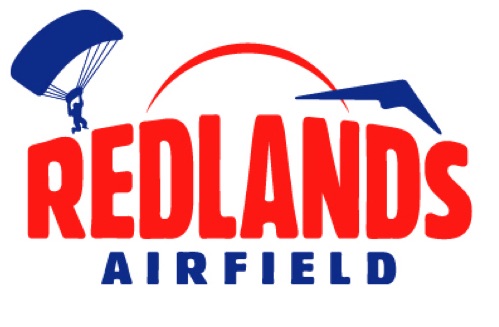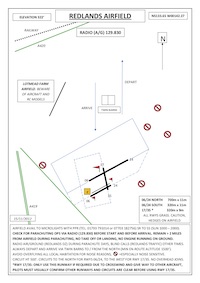Find Us by Air
We operate close to residential and rural noise sensitive areas, and rely on co-operation from both Redlands based and visiting pilots in observing the arrival/departure routes and circuit procedures explained below. Please follow them and help us to be good neighbours.
Please click the image below for a detailed A4 printable Airfield Chart containing all the information required for planning your flight to Redlands.
Please avoid over-flying Wanborough Village, Lotmead farm strip and the clusters of properties in close proximity to the Airfield (circled in red).
Please check-out the Anti Conflict Procedures to ensure that you know how to arrive and depart without meeting a parachute in the air!
Parachuting is active every week end and some week days. PPR is therefore essential.
| N5133.65 W00142.27 322ft AMSL 1nm East of Swindon |
|---|
| A/G Redlands radio/DZ on parachute days. 129.830 (microlight frequency) |
| Microlights only due to planning constraints |
| Operating hours: Monday - Saturday Sunrise to Sunset, Sundays 1000 to 2000hrs |
| PPR essential on 07703 182756 or 01793 791014 |
| No landing fees. Please log your arrival/departure in the airfield log located in the Clubhouse (portacabin) |
| Parachuting Fridays, Saturdays and Sundays and on occasion other weekdays - click here for Anti Conflict Procedures |
| Cafe open Saturdays and Sundays on parachuting days |
Runways, Arrival, Departure and Circuit Procedures
RUNWAYS
06/24 NORTH: This is the longest runway (700m) at Redlands. The jump plane ALWAYS uses this runway. The microlight school may use this runway. All procedures, circuits and departure / arrival routing are based around this runway.
06/24 SOUTH: This is a shorter (320m) parallel runway and is used simultaneously with runway 06/24 NORTH. This is the preferred runway for microlight pilots. The choice of runway used is at the pilot's discretion.
17/35: This is a "crosswind" runway and should only be used when the wind direction makes its use advantageous. Traffic on runways 06/24 will have priority (subject to the normal rules of the air). If a pilot elects to use runway 17/35, it is his/her responsibility to ensure by visuallychecking (backed up by radio if possible) that there is no conflicting traffic using the other runways.
CIRCUIT
06/24 NORTH: There will be only one circuit in use at any one time, being defined by runway 06/24 NORTH. Aircraft in this circuit will always have right of way. Circuits are to the north of the airfield, and the circuit height is 500'.
06/24 SOUTH: Traffic using runway 06/24 SOUTH will fly a circuit for runway 06/24 NORTH, and extend the base leg (or crosswind leg) of the circuit as required.
17/35: Traffic using the "crosswind" runway 17/35 will arrive and depart via the circuit for runway 06/24 NORTH. The circuit direction is dictated by aircraft already using runways
06/24, or in their absence by the windsock. Once it can be confirmed visually that there is no conflicting traffic (in the air or on the ground) then the arriving pilot will break off to join the circuit for runway 17/35. Circuits on runway17/35 are to the west. When performing this break-off manoeuvre, ensure that all turns are in the same direction as the main circuit wherever possible.
ARRIVALS / DEPARTURES
It is essential to check the status of the airfield (regarding parachute operations) before starting engines, and before approaching the airfield. All microlight operations are suspended during parachute drops.
Radio is air/ground (Redlands DZ) on parachuting days, and blind calls (Redlands traffic) at other times. The frequency is 129.830 Mhz (UK microlight frequency).
All traffic will arrive and depart to/from the north, passing to the right of the "twin barns" approximately ½ nm to the north of Redlands. Circuit height is 500', with a minimum en-route height of 1500'. There are no overhead joins and there is no signal square, however three windsocks can be seen from the "twin barns". Please avoid all local habitation for noise reasons.
Anti Conflict Procedures
The following procedures must be followed by all users of Redlands Airfield in order to minimise any potential for conflict and to ensure the safe use of the Airfield for all. These procedures have been agreed between the user groups and form part of the Airfield Procedures Manual.
Parachuting does not obstruct the microlighting activity at Redlands in any way. We operate a busy flying school and active club and the user groups meet up regularly to ensure that the procedures we have in place are working.
Visitors are always very welcome at Redlands. If you have any queries or concerns please do not hesitate to contact us.
1. Radio
All visitors to Redlands Airfield must be on radio.
Skydive London Drop Zone Control will be responsible for the Airfield radio on jump days, operating on the microlight frequency 129.830.
- All aircraft approaching Redlands to call Redlands DZ on 129.830 about five nautical miles from the Airfield for clearance to enter the circuit. Ask for parachuting information and advise your intention to land at Redlands.
- Redlands DZ will advise if parachuting is active or if the airfield is open to air traffic.
- If parachuting is in progress hold 2 nm from the Airfield and wait for clearance from DZ Control.
2. Ground to Air Visual Information
Cross
A white cross in the Drop Zone (in front of the large grey hangar) indicates parachuting is in progress. The Airfield is closed to all traffic. No engines are to be started or run and props turning must be shut down.
When the cross is ‘pulled in’ there is no parachuting and the Airfield is open to all traffic.
General Parachuting Information
The jump aircraft climbs within a 3 mile radius of Redlands.
Parachutists exit the aircraft upwind, up to 2 miles from the Airfield.
When a jump is in progress the airfield is closed for no more than 10 minutes
In an Emergency
There are two local airfields to Redlands, all of which can be used in an emergency. These are Lotmead Farm to the NW and Lower Upham to the South of the M4
(Call on safety comm frequency 135.475)

